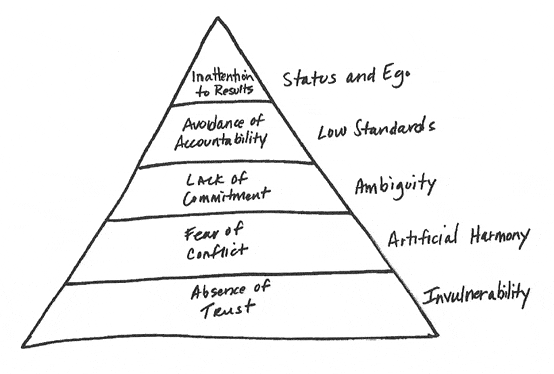2002 - The Five Dysfunctions Of A Team
Management
Patrick Lencioni
Summary
- Lead by example, and set the tone for the whole team:
- Absence of trust makes defensive behaviors and reluctant to ask for help.
- Fear of conflict makes inferior decisions because team members do not openly discuss.
- Lack of commitment makes the environments where ambiguity prevails.
- Avoidance of accountability makes team members naturally tend to look out for their interests, rather than the interests of the team.
- Inattention to results fails the business.
- Gauge the level of dysfunction in the team:

Image: tablegroup.com
Lead by example, and set the tone for the whole team:
Being the first one to be vulnerable.
Encouraging debate and conflict.
Making responsibilities and deadlines clear.
Setting the team’s standards.
Being clear on the team’s results.
If you get all the people in an organization rowing in the same direction, you could dominate any industry, in any market, against any competition, at any time.
Absence of trust makes defensive behaviors and reluctant to ask for help.
Happens when team members are unable to be vulnerable and open to one another without filters. They are unwilling to admit their mistakes, fears, or needs for help.
Members of great teams trust one another on a fundamental, emotional level, and they are comfortable being vulnerable with each other about their weaknesses, mistakes, fears, and behaviors.
Overcome by creating an environment that does not punish vulnerability and demonstrating vulnerability first. Make it comfortable being open, exposed, to one another around the failures, weaknesses, and fears. Without a certain comfort level among team members, a foundation of trust is impossible.
Reviewing MBTI, DiSC, 5 Dynamics results together helps build trust.
Fear of conflict makes inferior decisions because team members do not openly discuss.
Happens when lacking trust and psychological safety. Teams that are lacking on trust are incapable of engaging in unfiltered, passionate debate about key issues, causing situations where team conflict can easily turn into veiled discussions and back channel comments. In a work setting where team members do not openly air their opinions, inferior decisions are the result.
Teams with trust are not afraid to engage in passionate dialogue around critical issues and decisions. They do not hesitate to disagree with, challenge, and question one another, all in the spirit of finding the best answers, discovering the truth, and making great decisions.
Overcome by understanding that the conflict is natural, healthy, and productive, demonstrating restraint when people engage in conflict, and allowing the resolution to occur maternally as messy as it can sometimes be.
Healthy conflict is a time saver as it helps avoid revisiting issues again and again without resolution.
Lack of commitment makes the environments where ambiguity prevails.
Happens when people feel their opinions are not considered, and voices are not heard. Without conflict, it is difficult for team members to commit to decisions, creating an environment where ambiguity prevails. Lack of direction and commitment can make employees, particularly star employees, disgruntled.
Teams that engage in unfiltered conflict can achieve genuine buy-in around important decisions, even when various team members initially disagree because all opinions and ideas are put on the table and considered.
Overcome by making sure everyone is heard (e.g., “disagree but commit”).
Avoidance of accountability makes team members naturally tend to look out for their interests, rather than the interests of the team.
Happens when lacking commitment - people aren’t going to hold each other accountable if they haven’t bought into the plan. When teams don’t commit to a clear plan of action, even the most focused and driven individuals hesitate to call their peers on actions and behaviors that may seem counterproductive to the overall good of the team.
Teams that commit to decisions and standards of performance do not hesitate to hold one another accountable for adhering to those decisions and standards.
Overcome by demonstrating that the team respectfully have high expectations for one another’s performance and measuring progress and success.
Accountability is a willingness of team members to call their peers on performance or behaviors that might hurt the team.
Inattention to results fails the business.
Happens when individuals aren’t held accountable. Team members naturally tend to put their own needs (ego, career development, recognition, etc.) ahead of the collective goals of the team when individuals aren’t held accountable. If a team has lost sight of the need for achievement, the business ultimately suffers.
Teams that trust one another, engage in conflict, commit to decisions and hold one another accountable are very likely to set aside their individual needs and agendas and focus exclusively on what is best for the team.
Overcome by making the team results clear (placed above the individual’s status) and rewarding the behaviors that contribute to the team’s success.
Gauge the level of dysfunction in the team:
Do team members openly and readily disclose their opinions?
Are team meetings compelling and productive?
Does the team come to decisions quickly and avoid getting bogged down by consensus?
Do team members confront one another about their shortcomings?
Do team members sacrifice their own interests for the good of the team?